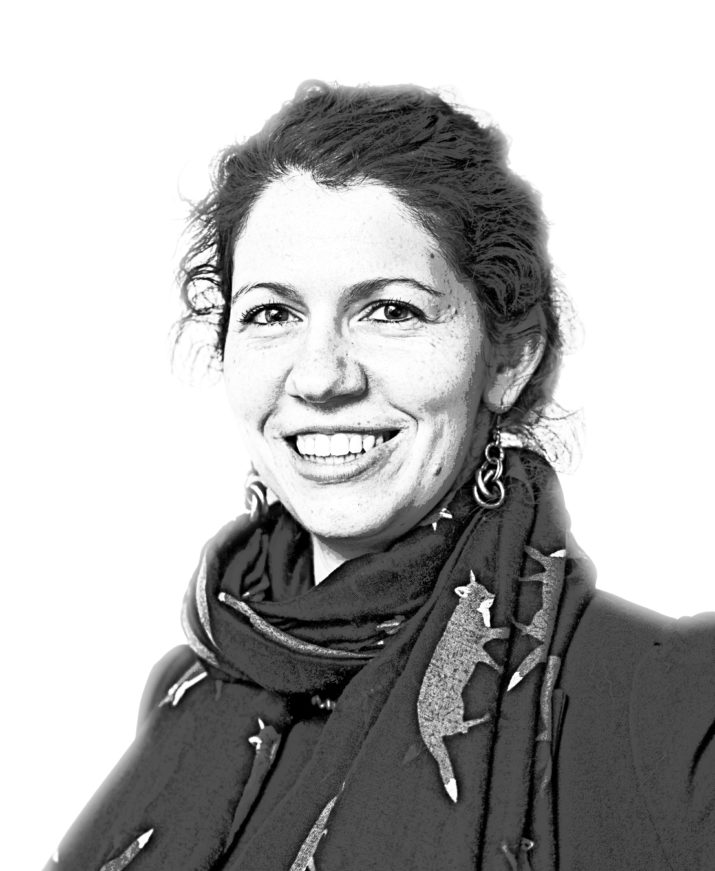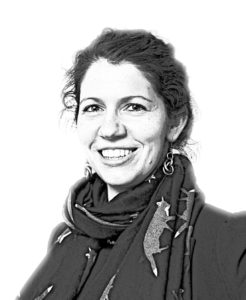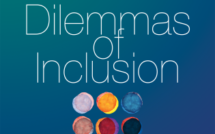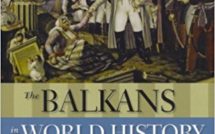

Elizaveta Strakhov, Assistant Professor of English at Marquette University, is invested in scholarship and teaching that crosses geographical, disciplinary, and temporal boundaries. Her current book project, Politics in Translation, examines a cross-European Francophone community. Her most recent undergraduate course, Crossing Over in Medieval England, similarly engages with the themes of transnational culture and national identity. Her work has been shaped by an interdisciplinary education and a personal history of migration and multilingualism. In both her teaching and scholarship, Dr. Strakhov is committed to thinking across time and space, challenging the artificial boundaries of national literary canons, periodization, and discipline and prompting us to consider how early history and literature speaks to our modern moment.
—Sarah Wilma Watson for EuropeNow
EuropeNow When did you first become interested in the idea of transnational literature? When did you begin thinking about literature outside the confines of nation-based literary histories?
Elizaveta Strakhov Those are great questions. I think my interest in transnational literature reaches as far back as high school when I was taking French and Latin at the same time. In particular, I remember reading Vergil’s Aeneid and noticing how its tendrils swept trans-historically and transnationally into so many places. I think that must have been the beginning. My interest increased in college when I was in a special undergraduate program called History and Literature, a build-your-own major where you took half of your courses in history and half in literature. I studied French, Italian, and Spanish literature from the Renaissance, all at the same time, and the interconnections between these bodies of literature became very clear to me. But, what ultimately solidified my interests and shaped my scholarship was going to graduate school at Penn. One semester, I was taking a seminar with David Wallace on Geoffrey Chaucer (c.1343-1400) and at the same time I was in a seminar with Kevin Brownlee on fourteenth-century French literature. It happened, by chance, that David assigned Chaucer’s The Book of the Duchess (c. 1368) the same week that Kevin assigned Guillaume de Machaut’s Fontaine Amoureuse (1360). I was reading the two texts for class and suddenly thought, “Wow, these texts are so similar!” and, indeed, Machaut’s Fontaine is, it turned out, a key source for Chaucer’s Duchess. I went and talked to David and Kevin and the idea for my dissertation was born – both David and Kevin said “you might consider focusing on the relationship between French and English culture” and I followed their advice.
EuropeNow Your dissertation has evolved into a book project entitled Politics in Translation: Canonizing Chaucer in the Hundred Years War. As I understand it, this project uncovers a cross-European Francophone literary discourse and cultural community. Could you speak a bit about this transnational literature and the cross-channel community it existed within? How did this situation come into being and how did it develop over the period of history covered by your project?
Elizaveta Strakhov I would love to tell you about this. Let me start by talking about the idea of “the nation.” We often take this term for granted, assuming that “nation” refers to a state, a government, a place limited by specific geographical boundaries. However, the term nacion in French, Latin, and Middle English in the early fourteenth century was actually a term related to social class and culture. To belong to the “gentle nation” meant to belong to the aristocracy. At this time, members of the aristocracy were speaking French and reading contemporary literature in French as well as texts from classical antiquity and late antiquity. These aristocrats were existing in a cultural space that had nothing to do with national borders.
England was, from the Norman Conquest (1066) onwards, a multilingual space with an extremely vexed but close relationship to continental France across the Channel. Many years after the Norman Conquest, the Hundred Years War broke out in 1337. This was a conflict born out of the fact that the English and French royal families belonged to the same family. Edward III of England became the heir to the French throne left vacant by the Capetians who died without an heir. But, because Edward was inheriting the throne from his mother, the French stepped in, found a law on the books, and claimed that he could not inherit – and this started the whole conflict.
Over the course of the war, the word “nation” starts to be used more and more frequently in contemporary discourse and “nation” begins to turn into the idea of “nation” as we see it today. The transformation of the word resulted from the rise of internecine conflict within a broad, formerly trans-national, trans-regional cultural space. Suddenly, the English start calling themselves a “nation” in the sense of a geographically delimited space united by a language and an ideology of statecraft. Soon, the French start saying this as well.
This shift seemed very striking to me. I began to ask: What would it be like to live through this period of transition? What do you do when suddenly the unified cultural space to which you belong starts to get fragmented by war? What happens when ideological political conversations start to divide these spaces into conflict zones? A person like Geoffrey Chaucer, who belonged to the “gentle” Francophone nation, faced a changing cultural landscape of this kind.
So within this complex historical situation, my book focuses on a particular genre of poetry called formes fixes poetry (fixed forms). This is a very rigid genre of poetry which uses formally restricted refrains, incipits (first lines), and rhyme schemes. The genre also has a delimited vocabulary of words and images, and a set of classical literary references that are used repeatedly. My argument is that because this genre of poetry is so formal and delimited, it allows the processes of translation and borrowing to become very visible. One writer reads the poem of another writer, borrows elements, and re-fashions them for his own poem. Then another poet comes along and does the same thing. Because the processes of adaptation and translation are so visible in this poetry it gives rise to a meta-poetic discourse about the processes of borrowing, adaptation, and translation. This discourse then becomes politicized in a period when French-speaking poets are trying to make sense of their newly politically fragmented cultural identity. The discourse begins on the continent in France and French-speaking regions, goes on to draw in poets like Chaucer, and continues to play out during the Hundred Years War. In the fifteenth century, after Chaucer’s death and in the later stages of the conflict, Chaucer begins to undergo canonization as an English poet even as English aristocrats continue to consume French literature with a passion. My argument is that Chaucer is canonized not because he is perceived as separate from France and French culture but because his work speaks to the continued, hyper-vexed sense of proximity between two countries in the process of splitting apart into separate political nations.
EuropeNow In addition to pursuing transnational scholarship, from what I understand, you also have a personal history of migration. You were born in Russia and moved to the United States when you were about four with your parents who are also both academics. Has your personal history of migration and multilingualism shaped your scholarship and teaching and, if so, how?
Elizaveta Strakhov Thank you so much for that great question. Yes, absolutely. They say that your first book, whether you are a fiction writer or an academic writer, is autobiographical in some way and that could not be more true for me. I was born in Russia, but to be more exact, since my scholarship is all about specifying where people are from culturally, I was born in the Soviet Union, in the capital, Moscow. I came to America with my parents when I was five, in 1989, before the fall of the Soviet Union, as an asylum seeker.
It seems to me that immigrants have two reactions to immigration – some people ideologically cast off the past and throw themselves into a new place and present while others isolate themselves and hold on to the past. My parents did the latter and so I grew up in a time capsule of 1989. But the Soviet Union my parents experienced and remembered was actually quite transnational – the Soviet Union had strong ties to Central Asia and to other parts of Eastern Europe. Russian cuisine is an incredible mixture of trans-regional influences – dumplings, for example, come to Russia from China, and shashlik (shish kebab) comes from central Asia. The same can be said about transnational influence on Russian film and literature. I grew up on folktales from Kazakhstan and Uzbekistan and stories from the Middle East and the Far East. The Soviet Union valued, in complicated and, of course, extremely politicized ways, its transnationalism.
So that is the environment in which I grew up. But, I also grew up in America which has its own set of cultural values and ideological spaces. At school I was American, and at home I was Soviet. At school I spoke English and at home Russian. This experience has made me think deeply about what it means to grow up in two cultures. Further, it has made me consider what it means to grow up in a culture that ceases to exist. The great tragedy of my parents’ 1989 time-capsule life is that there is no Soviet Union anymore, there is just nostalgia. So I began to ask: What do you do when political conflict destroys your cultural spaces? How do you hold on to cultural memories and build new spaces out of the ruins of the old?
EuropeNow I am turning now to questions of teaching. As a scholar whose work is transnational and multilingual, do you introduce your students to literature from multiple regions and languages? Is it possible to teach European literature in an English department and, if so, how?
Elizaveta Strakhov Blessedly, I am in a department that has no problems with transnational teaching and scholarship. This is not true of all departments, but mine welcomes all my transnational musings.
I don’t think you can teach the Middle Ages without engaging texts written in multiple languages. Medieval England was a multilingual space – people were reading Latin and French alongside Middle English. So, for example, in my class on medieval allegory, I assign my students both English texts and French and Latin texts in translation. We read major English works by Chaucer, the Pearl Poet, and William Langland, but before turning to these texts we study Latin and French texts that influenced these English poets, such as Boethius’ Consolation of Philosophy (523) and Guillaume de Lorris and Jean de Mean’s Romance of the Rose (c. 1230-1275). I explain to my students, “if you want to understand this as a historical continuum, you have to know what Langland, Chaucer, and the Pearl Poet were reading. Well, what they read was Latin stuff from at least 700 years before, so that is what we are going to read too.” We also read the Roman de Silence (The Romance of Silence) which is a poem about a woman named Silence who is raised as a man and then experiences a gender identity crisis. The story is set in England, among the descendants of King Arthur, but was written in France in the thirteenth century. Silence thus provides a great opportunity to think about why an author might write his or her poem in French but set the action of the story in England.
To conclude more broadly, I think it is worth mentioning two texts that are frequently taught in survey courses – Beowulf and The Song of Roland. Beowulf, which is considered to be at the heart of the English literary canon, is set in Scandinavia and is written in Anglo-Saxon, a language that differs enormously from present-day English. The Song of Roland similarly sits at the center of the French literary canon, yet the oldest manuscript recording the poem was produced in England. Examples like these prompt us to consider how the literary canon is artificially constructed. When I teach, I seek to introduce my student to the political realities behind how we think about canonical literature. Once you communicate the idea that English literature is ideologically inflected and socially constructed, you can teach anything you want while also teaching people something about ideology and history.
EuropeNow You are currently teaching a course entitled “Literature, History, and Culture: Crossing Over in Medieval England.” Could you tell me a bit about this course?
Elizaveta Strakhov Yes. It is a General Education class in the common core and usually includes numerous non-English majors. I designed the course to have a few thematic threads, specifically transnationalism, race, and gender, and my aim is to have these threads run through the Medieval and Renaissance texts and also connect the early material to the present day. We start with Anglo-Saxon poetry and continue to Marie de France, an Anglo-Norman poet who seems to have lived at the English court in the twelfth century. We then move on to selections from Geoffrey Chaucer’s The Canterbury Tales.
One Canterbury Tale that became quite central to the course was Chaucer’s Man of Law’s Tale. This text tells the story of Constance, a Roman princess, who travels to Syria where the Sultan converts to Christianity in order to marry her. The Sultan’s mother is furious and slaughters her son and sets her daughter-in-law out to sea. Constance arrives in Northumberland, England, which at the time of the story is still pagan, and converts the population to Christianity before returning to Rome. Chaucer’s text posits Syria and England as the two margins of the known world, both of whom are in need of Christianization, and forces us to reimagine how England is defined. Because the tale engages with English identity, transnationalism, race, and religion it became the cornerstone of the entire class.
Alongside medieval texts we read modern adaptations of the Canterbury Tales, particularly the political ones, such as Patience Agbabi’s Telling Tales (2014) and Jean “Binta” Breeze’s “The Wife of Bath in Brixton Market” (2009). We also look at Refugee Tales, an amazing political project which involves refugees telling their stories to a group of writers and poets who then craft a new set of Canterbury Tales about newcomers and asylum seekers arriving in England. Reading these stories troubles our notion of what it means to have an English political and cultural space.
This course syllabus has undergone many revisions. I brought in all of the modern connections very recently and it has had very positive effects on the way the class is working now.
EuropeNow Well, that’s a perfect transition to the final question I want to ask you, which is about the modern connections you have incorporated into your teaching. Your Crossing Over course seems to cross space and cultures but it also crosses time. Why do you think it is important to cross time in this way and make medieval literature speak to the modern moment?
Elizaveta Strakhov Well first and foremost because medieval texts do speak to the modern moment. Let me use the response of one of my students to Chaucer’s “Clerk’s Tale” as an example. “The Clerk’s Tale,” which is another story from The Canterbury Tales, centers on a tyrannical marquis who marries the poorest girl in his village and then proceeds to emotionally torture her, testing her loyalty and obedience in increasingly brutal ways to see if she will break. Ultimately he is the one who breaks, suggesting that she perhaps has more power than it initially seems. We were discussing the tale in class and one of my students suddenly burst out saying “this is so modern!” I replied, “what do you mean by that?” and he answered “well this entire work is about conflict and power dynamics between men and women. It is about abuse, it is about violence, it is about misogyny. This is as relevant today as it must have been to fourteenth-century readers. Nothing has changed!” I try to draw students out in these moments and emphasize the sometimes unsettling continuity between the past and the present.
I also teach John Gower’s Vision of England in this way. This text is Gower’s very negative response to the Peasants’ Revolt of 1381. When teaching the work, I show my students news coverage of two different events that were termed “riots” by the media. When the Red Sox won the World Series in 2004 and a group of white fans torched cars and looted buildings, the news casters observed that “boys will be boys” and explained that “things got a little out of hand.” In contrast, when a Black Lives Matter protest for the shooting of Keith Lamont Scott in Charlotte, North Carolina in September, 2016 unfortunately turned violent, the young black protesters were described as “criminals” and “thugs” who “deserved to rot in jail.” These very different descriptions were prompted by the exact same actions, in fact there was more crime committed in Boston by the Red Sox fans. After watching this footage, I ask my students: “So what is a riot?” We discover that an event is termed a “riot” when people disagree with why you are protesting. Conversely, if you are committing violence over a sports win, that is not a riot, it is just things “getting out of hand.” So, I think that the medieval speaks to the modern profoundly. When Gower rains insults and Hell fire narratively on the peasants, he is speaking out of the same position of class animosity, anger, and fear that modern politicians have used against the Parkland, Florida protestors, for example, telling them to stay calm and not speak out against the prevailing social order. Showing these parallels to students helps them think through both the past and, importantly, the present.
I think if we communicate this continuity to our students, if we explain to them how deep these issues reach, how far back they go, it will help us understand how important it is to dismantle racial prejudice, social prejudice, and misogyny in our own period.
Elizaveta Strakhov is Assistant Professor of English at Marquette University. She received an A.B. in History and Literature from Harvard University and an M.A. and Ph.D. in Comparative Literature from the University of Pennsylvania. Prior to coming to Marquette, she was a Mellon Postdoctoral Fellow in Medieval French at Northwestern University. Her research and teaching engage with transnationalism studies, multilingualism, translation theory, and the history of the material text. Her current book project, Politics in Translation: Canonizing Chaucer in the Hundred Years War, uncovers an unknown cross-European Francophone discourse, taking place within a specific lyric genre known as the formes fixes, that responded to the emergence of proto-nationalist lines of division during the Hundred Years War (1337-1453). She is the author of several articles on medieval Francophone poets and is a contributor to David Wallace’s recent edited collection Europe: A Literary History, 1348-1418 (OUP, 2016).
Sarah Wilma Watson is a Mellon-CES Editorial Fellow for EuropeNow. She holds a B.A. in English and History from the University of Rochester, an M.A. in Medieval Studies from Fordham University, and a Ph.D. in English from the University of Pennsylvania. She recently completed a dissertation on the reception of Christine de Pizan, a Parisian poet, in fifteenth-century England.




